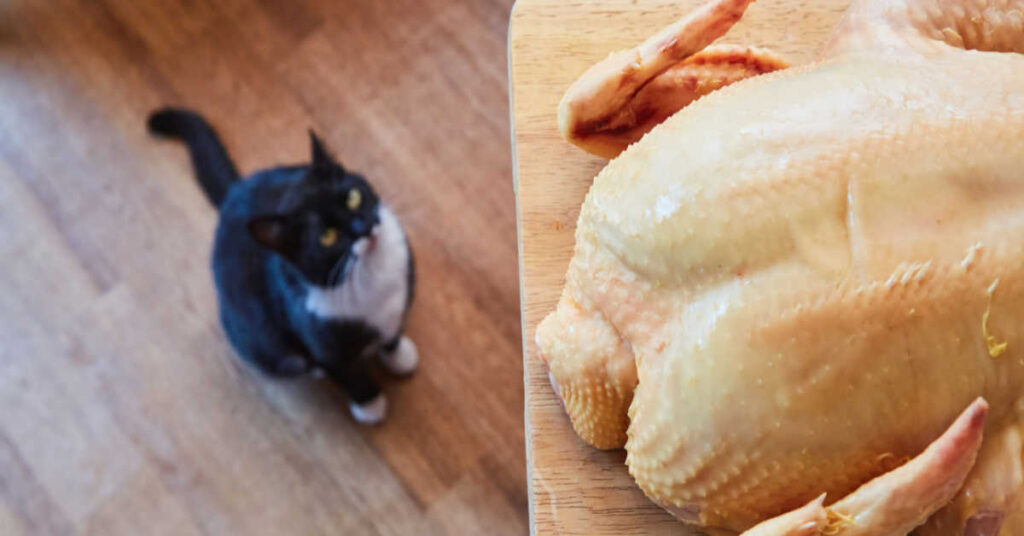Can Cats Eat Cornish Hens? Can Meat Cause IBD In Cats?
Cornish hens are a type of chicken that weighs less than 3 pounds. They’re often sold in pairs (a hen and rooster) or individually, they can also be found on poultry farms or poultry stores.
Yes! Cats can eat Cornish hens, they are a great source of protein and nutrients, and they’re also a nice change from your cat’s regular diet. Feeding your cat Cornish hens can help them stay healthy and prevent any negative health issues.
Grab the Puuurrr-fect Planner to keep track of your cat’s health and well-being ON SALE NOW!

Cornish hens offer many benefits to cats.
They’re high in protein, which helps cats maintain muscle mass as they age.
They provide essential nutrients like Thiamin, Folate, Vitamin A, Vitamin B12, Vitamin D3 and Niacin. These can keep your cat healthy and strong.
In addition, cats have a carnivorous diet, and they need protein from to stay healthy. Cornish hens are a great source of protein for cats because they’re small and easy for cats to digest and contain many essential nutrients.
See also: My Cat Will Only Eat Chicken: Can Cats Live On Chicken Alone?
Is It Safe to Feed Chicken to Cats?
Yes, it is generally safe to feed chicken to cats
Chicken is high in protein and low in fat, which makes it a great choice for cats who are overweight or have diabetes.
The meat is also low in purines and can help prevent kidney disease. However, the bones are not suitable for cats. Thats because they can splinter and cause injury. So, you should avoid giving them raw chicken or cooked chicken that haven’t fully been deboned.
Chicken is also a great source of protein and an excellent source of vitamin B6, which is important for helping your cat’s body make other vitamins.
What Parts of Chicken Can Cats Eat?
The parts of chicken that cats can eat are the same as the parts of chicken that people can eat, this includes areas like the breast or thighs.

However, you should avoid feeding your cat chicken skin. Skin is mostly where salts and spices are absorbed in large quantities during preparation.
These salts and spices can be harmful to your cat. Other than that, it has been reported that skin has turned out to be a choking hazard for cats.
But nonetheless, chicken is a great source of protein, and it’s a good idea to feed your cat a variety of different meats so they get all the nutrients they need.
What Meat Should Cats Not Eat?
Cats should also avoid all types of raw meat and fish. These foods are more likely than cooked meats to contain bacteria that could make your cat sick.
Although people might think that fish is the best meat for cats to eat. Cats can’t easily digest raw fish, and it has a high mercury content that can be toxic.
And some people may wonder where the high mercury content in fish comes from. Well, Fish take up mercury from streams and oceans as they feed.
Raw eggs are another food item that should be avoided by cats because it may cause anemia or kidney failure in some cases.
Meat That Is Totally Safe for Cats to Eat
- Chicken: Chicken is another good source of protein, but you’ll want to avoid giving them chicken bones because they can be dangerous if swallowed whole by your cat.
- Lamb: Lamb is a great meat option for cats because it doesn’t have much fat or calories, so you won’t have to worry about feeding too much of it to your feline friend!
There are many more meat foods that are totally safe for cats to eat without any worries. Those mentioned above are just among them.
Can Meat Cause IBD In Cats
It’s possible for meat to contribute to your cat’s IBD. Although there is no definitive evidence that meat can cause IBD.
It is a factor to be taken into consideration. However, all hope isn’t lost. There are plenty of ways to help manage symptoms of IBD without completely cutting out meat or other foods cats naturally enjoy.
Appetite Stimulant for Cats With IBD
Cats with inflammatory bowel disease (IBD) often have trouble keeping their appetites up. This can be a problem because if your pet doesn’t eat, it could lead to further health problems.
The best appetite stimulants for cats with inflammatory bowel disease (IBD) are ones that are designed to be safe for both cats and humans.
For this reason, I recommend feeding your cat a diet of dry food or canned food supplemented with wet food.
The dry food should be low in fiber, which is important for cats with IBD because high-fiber foods can cause nausea and diarrhea.
The wet food should contain a high percentage of protein and fat. Thats because these types of foods will stimulate your cat’s appetite.
If your cat is still having trouble eating, you may want to consider trying a food supplement. These may include multivitamin for cats from Vetriscience laboratories
Multivitamin for cats is an appetite stimulant that’s formulated with ingredients that are perfect for cats with ibd.
It will help your cat feel more comfortable, which can help them eat more comfortably as well. It also includes other types of essential nutrients necessary for your cat.
Read also: Can Cats Have Chicken Wings?
Conclusion
Based on a study of the same name by the Animal Medical Center in New York City, researchers found that cats really can eat Cornish hens.
The feline equivalent of chicken, Cornish hens are quite popular for their tender and sweet meat that’s easy to digest.
As long as they don’t contain any dangerous additives or preservatives, Cornish hens are safe for cats to eat. In any case, always use your best judgment when it comes to serving your cat new foods. Because some foods can cause serious gastrointestinal diseases.
However, it is not uncommon to take your cat to the vet with severe gastrointestinal symptoms and suspected inflammatory bowel disease. There is much debate in the veterinary community as to what causes IBD in cats.
While there can be several factors that can cause IBD in cats, there is a specific mathematical formula that vets use to determine which specific bacteria are present that may be causing the inflammation in your cat’s colon.
More resources
https://pets.webmd.com/cats/ss/slideshow-foods-your-cat-should-never-eat
https://www.rspcapetinsurance.org.au/pet-care/cat-care/what-should-feed-cat
